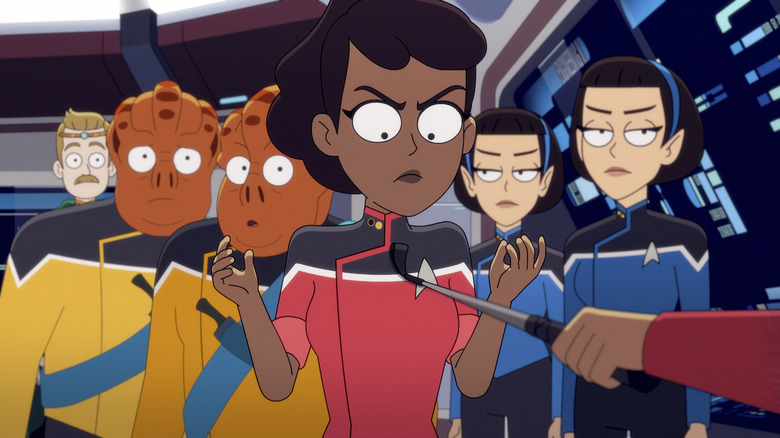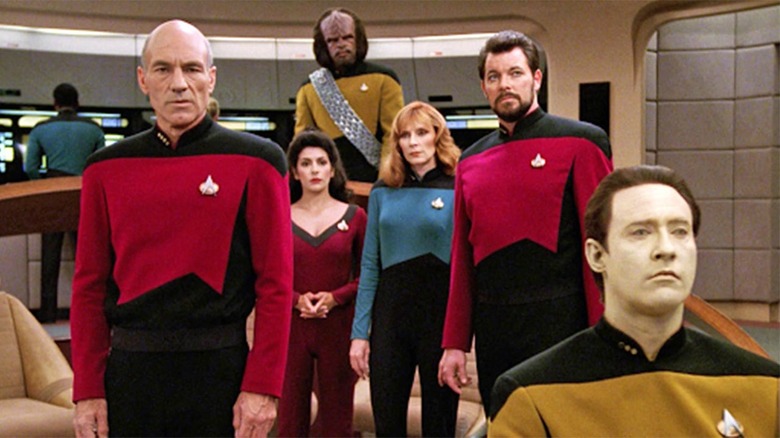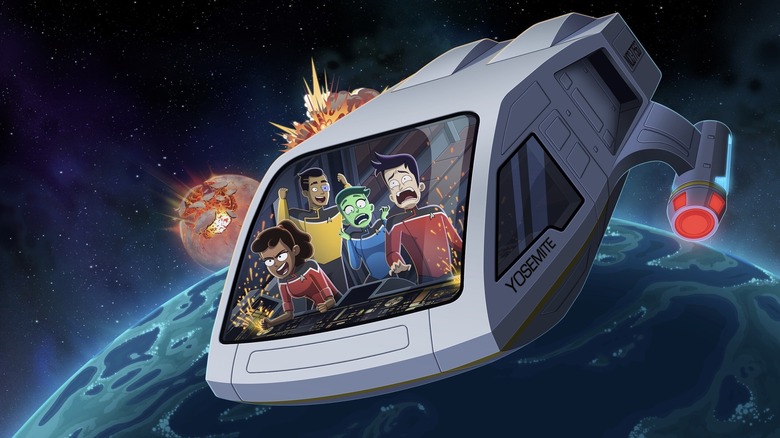Star Trek: Lower Decks Season 5 Cheekily Mocks Gene Roddenberry's Worst Idea Ever
Captain on the deck! This article contains spoilers for the season 5 premiere of "Star Trek: Lower Decks."
The crew members of the USS Cerritos are back in action and they haven't lost an iota of the snark, humor, and ever-so-earnest love for "Star Trek" that made us all fall in love with the animated show in the first place. (/Film's Jacob Hall delivered his glowing review of the fifth and final season of "Lower Decks" here.) For those who missed the simple camaraderie prevalent among the tight-knit group of Lower Deckers, the easy chemistry between ensigns Beckett Mariner (Tawny Newsome), Brad Boimler (Jack Quaid), Samanthan Rutherford (Eugene Cordero), and all the rest is an instant delight in the premiere. But for the hardcore Trekkies who have been craving the serious deep-cut references that this writing team has proven to be experts at, there's plenty of that to be found, as well.
The most noteworthy instance of this in the premiere might also be the most unexpected — and the most subtle. Titled "Dos Cerritos" (a perfectly pun-tastic allusion to the mirror universe shenanigans at the center of the episode), the episode wastes no time putting our Prime Universe characters on a crash course with ... themselves. Thanks to a good ol' fashioned quantum fissure, which Beckett complains is "the third one this month," both versions of our cast end up stuck and forced to work together to return the "fake" crew back to their own reality. Other than the requisite facial hair differences and other personality quirks, everyone seems more or less the same as their counterparts; everyone, that is, except mirror-universe Mariner herself. A no-nonsense captain who preaches strict adherence to Starfleet protocol, her demands of "no interpersonal conflict" among her officers couldn't be more different from our favorite insubordinate renegade.
To those who know their "Trek" history, it also doubles a brazen joke directed towards Gene Roddenberry's most infamous franchise edict.
The Gene Roddenberry rule that almost broke Star Trek
Everybody knows that the future depicted throughout "Star Trek" is meant to be a thriving utopia, but casual viewers might not realize how much that very same premise actively worked against the franchise's own interests. There's no shortage of praise to be heaped upon the shoulders of Gene Roddenberry, the visionary who brought his optimistic and aspirational (and, oftentimes, weirdly horny) take on science fiction to the world at large. Sometimes, though, even his own best intentions made a mess of things.
Enter the Gene Roddenberry no-conflict rule, an extension of his extremely inflexible belief that humanity would inevitably arrive at a place where they would simply transcend the petty arguments, misunderstandings, and differences of opinion that plague us savages on a daily basis. While it makes a certain amount of sense, it also caused one painfully obvious problem: In fiction, the total absence of conflict among your core cast of characters makes for an awfully boring story. No matter! Roddenberry enforced this rule to the strictest letter of the law, particularly during the early seasons of "The Next Generation," and made it so that no members of the USS Enterprise could ever experience interpersonal conflict among themselves, instead only clashing with the comparatively less enlightened aliens and civilizations they encountered over the course of their missions. Starfleet has a reputation to maintain, after all, regardless of how ridiculous (or, ironically, pathologically unbalanced) it made the characters seem.
Sound familiar?
Lower Decks goes meta (again) in season 5
While some purists initially had a hard time getting on board with "Lower Decks" and its tendency to turn into a parody of "Star Trek," thank goodness this self-deprecating series has never been above making fun of itself. That instinct comes back to the fore in the premiere with the hilarious dynamic between our own Beckett Mariner and "Captain Becky." Although they get along splendidly at first, it soon becomes clear that this version of Beckett will stop at nothing to maintain order among the rank and file — even if it begins to creep into outright authoritarian territory. The mirror universe has always been used as a mirror (it's in the name!) to our favorite figures, holding up a dark reflection of what they could become if they gave into their worst impulses. For Mariner, that amounts to a merciless iron fist that she wields over the officers under her command and her very specific phrasing of what's clearly her #1 rule: No interpersonal conflict among the crew.
By taking such a meta approach, the "Lower Decks" writers cleverly turn the screws on themselves — or, more accurately, past versions of "Trek." Beckett essentially runs her starship just as Roddenberry would've wanted, in theory. Of course, that proves to be a mistake that can only be set right by the most extreme of circumstances: a visit by their own alternate-universe selves. Before anyone claims that "Lower Decks" is taking unfair shots at its own creator, think again! There's something to be said for reusing the concept of the mirror universe, first seen in "The Original Series" and the classic episode "Mirror, Mirror," as a way of holding "Trek" to its highest standards. The characters aren't the only ones evolving and learning from mistakes — the franchise itself has had to do plenty of that over the decades, too. In that sense, "Lower Decks" is just the latest link in the chain of progress.
New episodes of "Lower Decks" stream on Paramount+ every Thursday.


